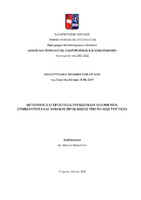Metaverse και προστασία προσωπικών δεδομένων : συμβατότητα και νομικές προκλήσεις υπό το φως του ΓΚΠΔ

View/
Keywords
Metaverse ; Γενικός Κανονισμός Προστασίας Δεδομένων (ΓΚΠΔ) ; Άβαταρ ; Ειδικές συσκευές εμβύθισης ; Phygital world ; Datafication ; Τεχνητή νοημοσύνη ; XR ; Blockchain ; Βιομετρική ψυχογραφία ; Προστασία προσωπικών δεδομένωνAbstract
The present master's thesis focuses on the issue of compatibility and, in general, the legal challenges that the Metaverse will raise in relation to EU data protection law, specifically the GDPR.
The relevant analysis is presented in two chapters. Chapter A provides an introduction to the concept of the Metaverse, analyzes its basic characteristics, the specific technologies that will enable its implementation and effective functioning, as well as the competing visions that have prevailed regarding its structure and governance model. Additionally, reference is made to the diverse investment community it has attracted and emphasis is placed on the dominant sectors that are expected to be strengthened and reshaped by it. The chapter concludes with a description of the EU's agenda for the Metaverse and the reasons why this thesis focuses on the relationship of its private platforms with EU data protection law, thus setting the stage for Chapter B.
Chapter B begins with a concise reference to the foundation of the right to personal data and the recent establishment of the GDPR by the EU, in the light of new technological advancements. It then explores the substantive and territorial application of the GDPR in the Metaverse. Furthermore, it thoroughly examines the main data protection issues that will arise due to the latter’s prevalence in the EU market and proposes solutions for their mitigation. Among the legal challenges, particular emphasis is laid upon the mass processing of biometric and other personal data extracted by specialized immersive devices in the Metaverse, the difficulty of clearly identifying the liable parties, ensuring transparent information, obtaining user consent and guaranteeing the lawfulness of the processing of their data under the current legislative framework, the detrimental consequences of behavioral advertising and algorithmic decision-making in the dystopian version of the Metaverse, the need to ensure portability and continuous transfer of personal data outside the EU for the interoperability of the virtual world, the jeopardization of their security by internal and external threats, and finally, the intricate relationship between the GDPR and Blockchain as the technology on which the operation of the Metaverse will rely, to a greater or lesser extent.


